Israel will have to vacate its occupied territories and make space for a state of Palestine, writes M.K. Bhadrakumar. This crushing defeat for the U.S. will mark the end of its global dominance.

A flag bearer leading the triumphal Arab entry into Akaba after the defeat of Ottoman defending forces, 1917. (T E Lawrence and the Arab Revolt 1916 – 1918, Imperial War Museums, Wikimedia Commons, Public domain)
By M.K. Bhadrakumar
Indian Punchline
 One hundred years after the Arab Revolt (1916-1918) against the ruling Ottoman Turks amidst the impending defeat of Germany and the Triple Alliance in World War I, another armed uprising by the Arabs has erupted.
One hundred years after the Arab Revolt (1916-1918) against the ruling Ottoman Turks amidst the impending defeat of Germany and the Triple Alliance in World War I, another armed uprising by the Arabs has erupted.
This time around it’s against Israeli occupation, in the backdrop of the looming defeat of the United States and NATO in the Ukraine War — presenting a spectacle of history repeating unabridged.
The Ottoman Empire disintegrated as a result of the Arab Revolt. Israel too will have to vacate its occupied territories and make space for a state of Palestine, which of course, will be a crushing defeat for the U.S. and marks the end of its global dominance. It is reminiscent of the Battle of Cambrai in Northern France (1918) where Germans — surrounded, exhausted and with disintegrating morale amidst a deteriorating domestic situation — faced the certainty that the war had been lost, and surrendered.
The torrential flow of events through the past week and a half have been breathtaking, starting with a phone call made by Iran’s President Sayyid Ebrahim Raisi to the Saudi Crown Prince Mohammed bin Salman on Oct. 11 to discuss a common strategy toward the situation following the devastating attack by the Islamic Resistance Movement, Hamas, against Israel four days before.
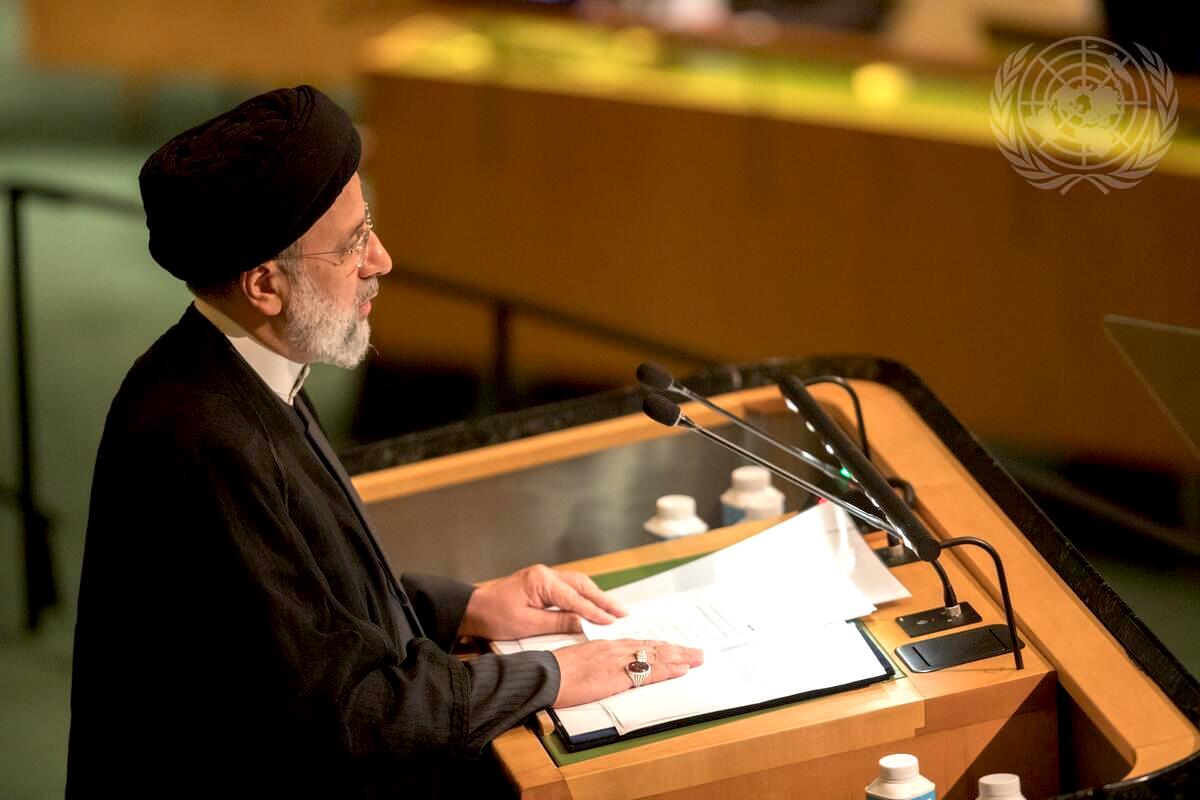
Raisi addressing the U.N. General Assembly in 2022. (UN Photo/Jaclyn Licht)
Just before that, in a powerful statement, Iran’s Supreme Leader Ayatollah Ali Khamenei emphasized that:
“From the military and intelligence aspects, this defeat (by Hamas) is irreparable. It is a devastating earthquake. It is unlikely that the (Israeli) usurping regime will be able to use the help of the West to repair the deep impacts that this incident has left on its ruling structures.”
(See my blog Iran warns Israel against its apocalyptic war.)
A senior Iranian official told Reuters that Raisi’s call to the crown prince aimed to “support Palestine and prevent the spread of war in the region. The call was good and promising.”
Having forged a broad understanding with Saudi Arabia, Iran’s Foreign Minister Hossein Amir-Abdollahian held discussion with his Emirati counterpart, Sheikh Abdullah bin Zayed, during which he called upon Islamic and Arab countries to extend their support to the Palestinian people, emphasizing the urgency of the situation.
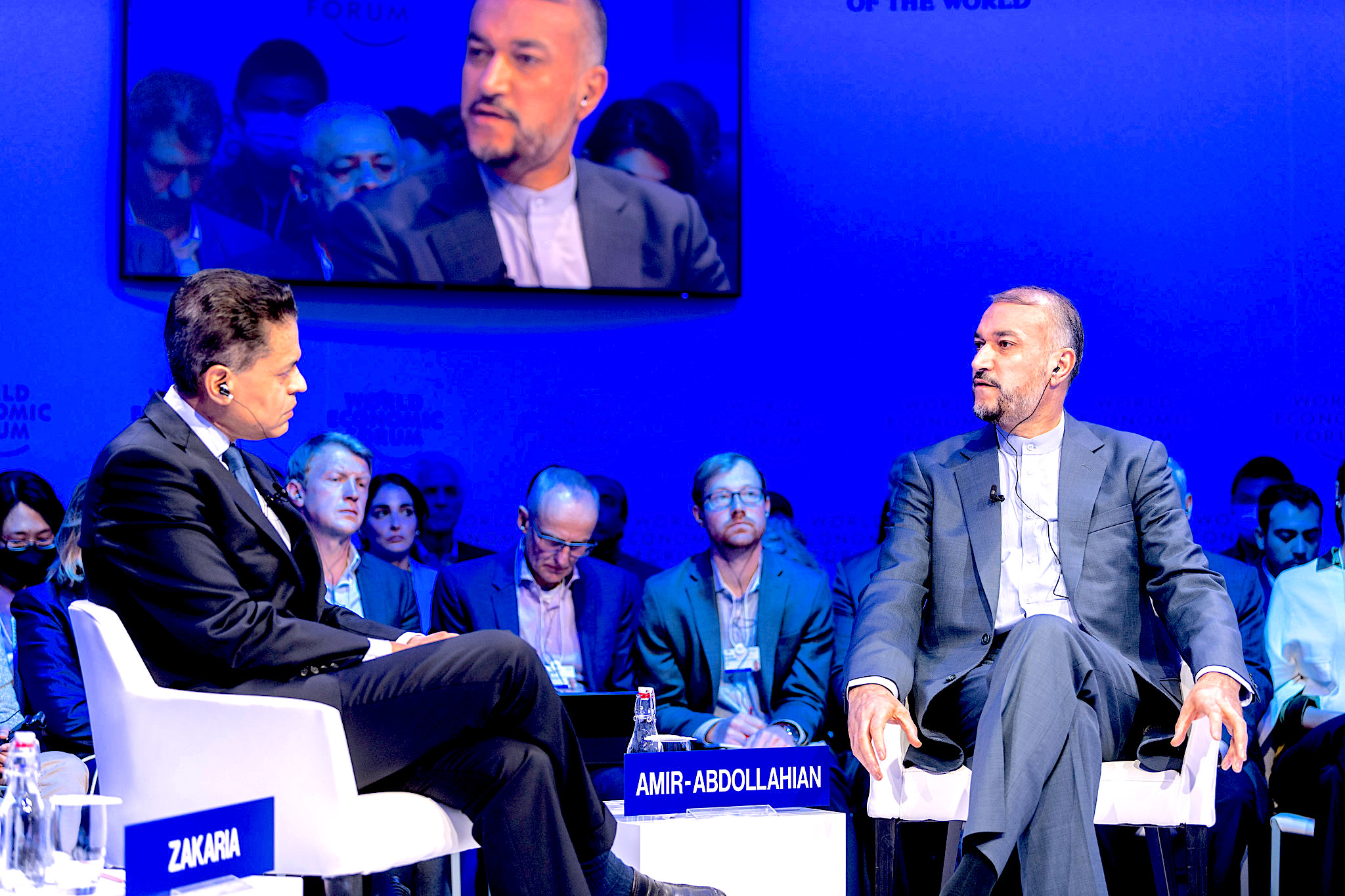
Amir-Abdollahian, on right, with CNN’s Fareed Zakaria at the World Economic Forum in Meeting in May 2022 in Davos-Klosters, Switzerland. (World Economic Forum/Flickr, Mattias Nutt, CC BY-NC-SA 2.0)
Also late last week, Amir-Abdollahian embarked on a regional tour to Iraq, Lebanon, Syria and Qatar for a couple of days to coordinate with the various resistance groups. Notably, he met Hezbollah leader Hassan Nasrallah in Beirut and Hamas leader Ismail Haniyeh in Doha.
Amir-Abdollahian told the media that unless Israel stopped its barbaric air strikes on Gaza, an escalation by the Resistance is inevitable and Israel could suffer a “huge earthquake,” as Hezbollah is in a state of readiness to intervene.
Meanwhile, Tehran has delivered a strong message to Tel Aviv via the U.N. that it will have to intervene if the Israeli aggression on Gaza persists, Axios reported last weekend, citing two diplomatic sources.
Simply put, Tehran will not be deterred by the deployment of two U.S. aircraft carriers and several warships and fighter jets off the shores of Israel.
Last weekend, on Sunday, White House National Security Advisor Jake Sullivan acknowledged that the U.S. couldn’t rule out that Iran might intervene in the conflict.
In the meantime, while Iran was coordinating with the resistance groups on the military front, China and Saudi Arabia shifted gear on the diplomatic track.
On Oct. 12, as U.S. Secretary of State Antony Blinken was heading for Arab capitals after talks in Tel Aviv, seeking help to get the hostages released by Hamas, China’s Special Envoy on the Middle East Zhai Jun contacted the Saudi deputy minister for political affairs, Saud M. Al-Sati, on the Palestine-Israel situation, particularly the humanitarian crisis unfolding in Gaza.
The contrast couldn’t be sharper.
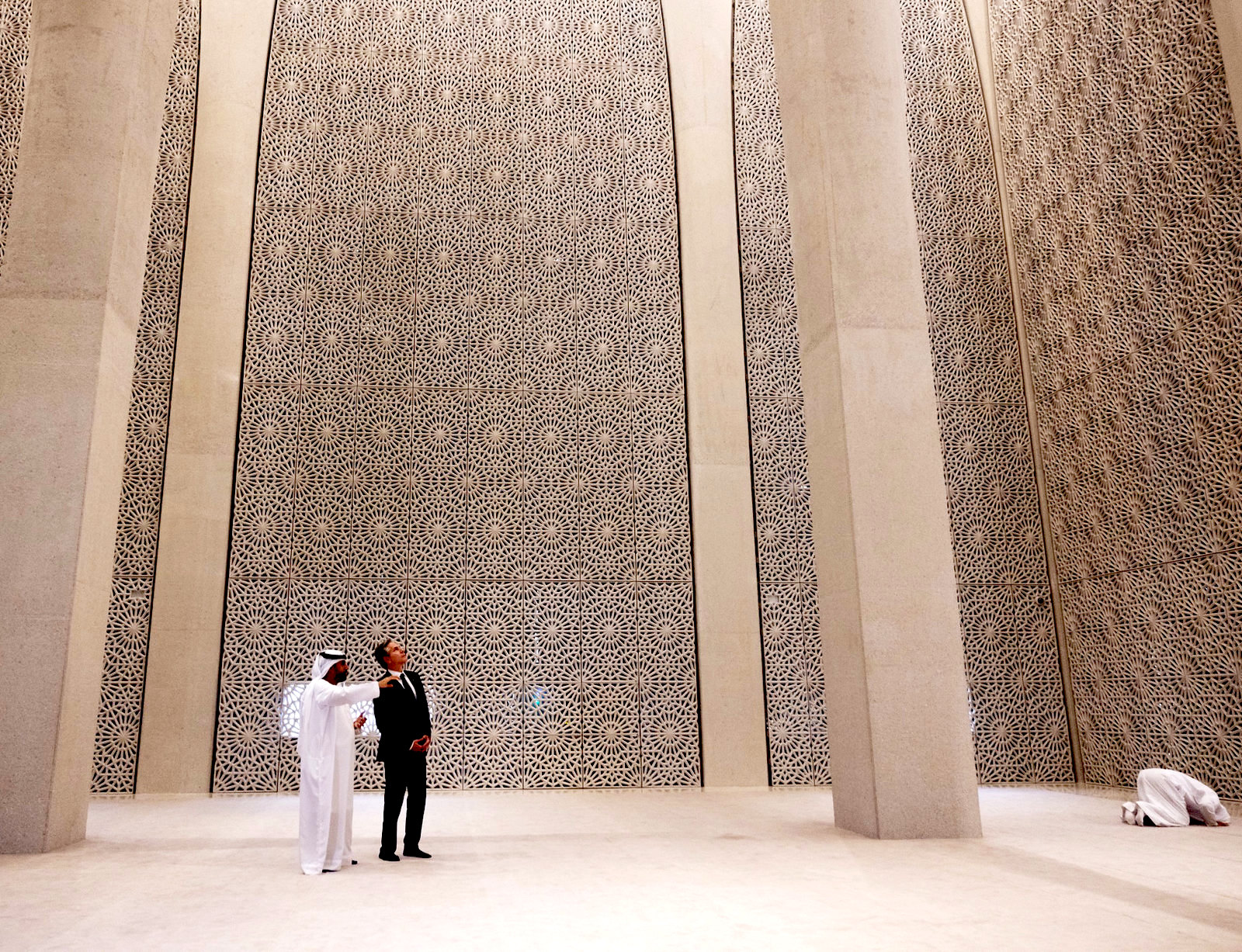
Blinken touring the Imam Al-Tayeb Mosque at the Abrahamic Family House, in Abu Dhabi, U.A.E., Oct. 14. (State Department, Chuck Kennedy, Public domain)
On the same day, an extraordinary event took place in the Chinese Foreign Ministry when the Arab envoys in Beijing sought a group meeting with Special Envoy Zhai Jun to underscore their collective stance that a “very severe” humanitarian crisis has emerged following Israel’s attack on Gaza and “the international community has the responsibility to take immediate actions to ease the tension, promote the resumption of talks for peace, and safeguard the Palestinian people’s lawful national rights.”
The Arab ambassadors thanked China “for upholding a just position on the Palestinian question … and expressed the hope that China will continue to play a positive and constructive role.”
Zhai voiced full understanding that the “top priority is to keep calm and exercise restraint, protect civilians, and provide necessary conditions for relieving the humanitarian crisis.”
After this extraordinary meeting, the Chinese Foreign Ministry posted on its website at midnight a statement by Foreign Minister Wang Yi titled “China Stands on the Side of Peace and Human Conscience on the Question of Palestine.” This reportedly prompted a call by the Saudi Foreign Minister Prince Faisal bin Farhan to Wang Yi.
Interestingly, Blinken too called Wang Yi from Riyadh on Oct. 14, where, according to the State Department readout, he “reiterated U.S. support for Israel’s right to defend itself and called for an immediate cessation of Hamas’ attacks and the release of all hostages” and stressed the importance of “discouraging other parties (read Iran and Hezbollah) from entering the conflict.”
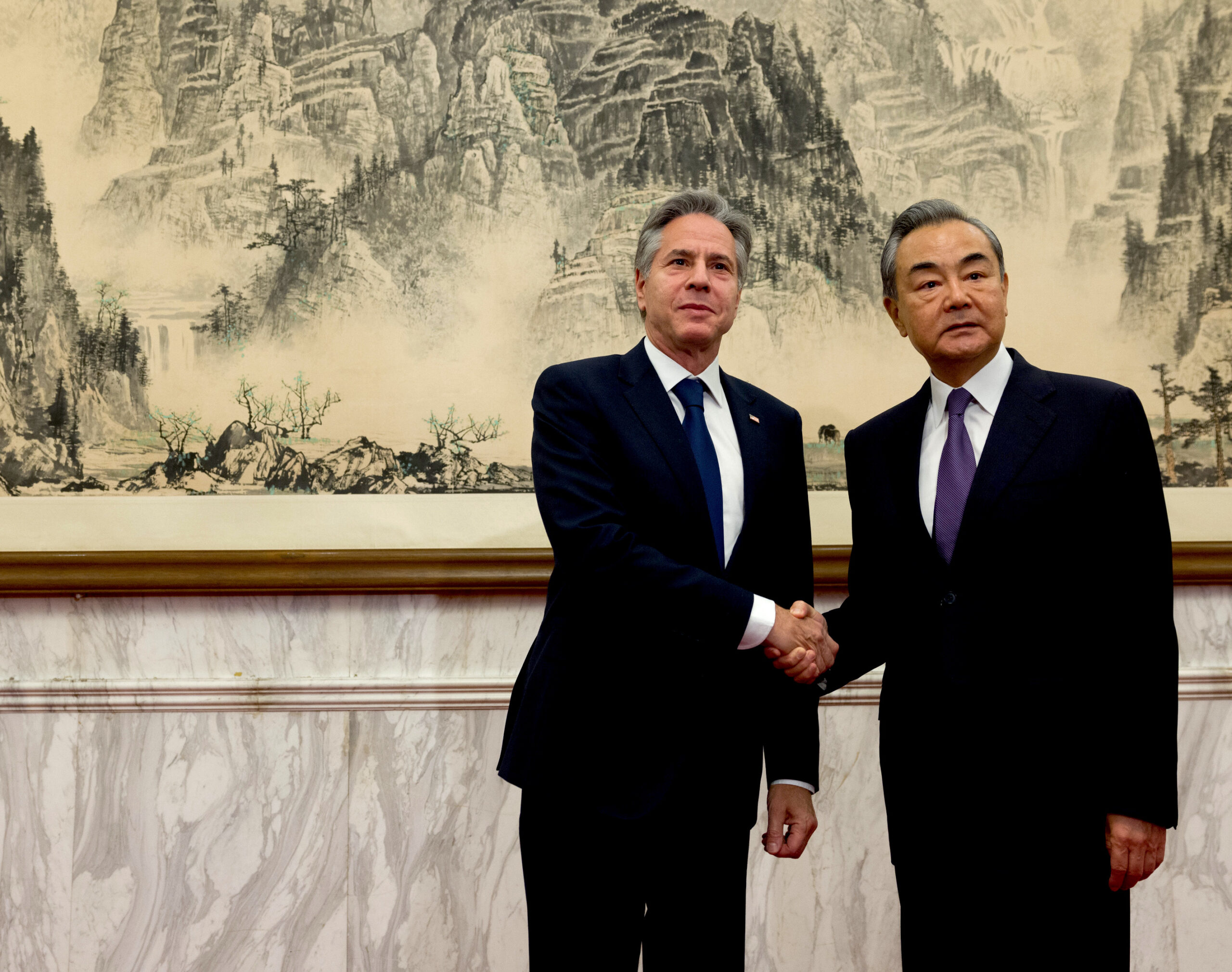
Blinken and Wang Yi in Beijing in June. (U.S. State Department, Public domain, Wikimedia Commons)
Succinctly put, in all these exchanges involving Saudi Arabia — especially, in Blinken’s meetings in Riyadh with the Saudi foreign minister and Crown Prince Mohammed bin Salman, while the U.S. focused on the hostage issue, the Saudi side turned the attention to the humanitarian crisis in Gaza.
The State Department readouts (here and here) bring out the two sides’ divergent priorities.
A coordinated Saudi-Iranian strategy backed by China is putting pressure on Israel to agree to a ceasefire and to de-escalate. The U.N.’s backing isolates Israel further.
Israeli Prime Minister Benjamin Netanyahu’s exit is to be expected but he won’t throw in the towel without a fight. U.S.-Israel ties may come under strain.
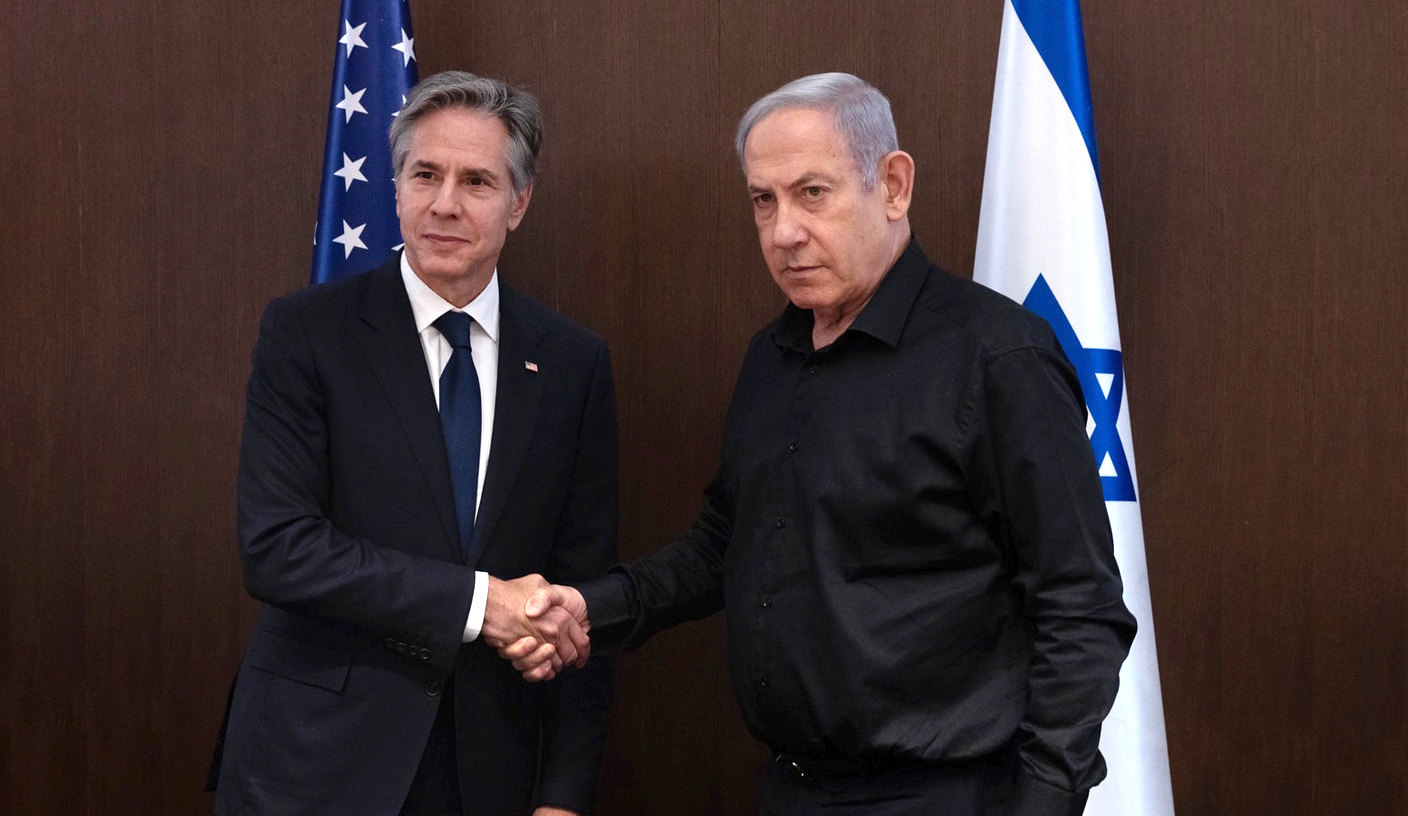
Blinken with Netanyahu in Tel Aviv on Monday. (State Department, Chuck Kennedy, Public domain)
Biden is caught in a bind, harking back to Jimmy Carter’s predicament over the Iran hostage crisis in 1980, which ended his bid for a second term as president. Biden is already backtracking.
Where do things go from here? Clearly, the longer the Israeli assault on Gaza continues, the international condemnation and demand to allow a humanitarian corridor will only intensify. Not only will countries such as India, which expressed “solidarity” with Israel, lose face in the Global South, even Washington’s European allies will be hard-pressed. It remains to be seen whether an invasion of Gaza by Israel is anymore realistic at all.
Going forward, the Arab-Iran-China axis will raise the plight of Gaza in the U.N. Security Council. [On Wednesday the U.S. vetoed a draft resolution calling for a humanitarian ceasefire. A Russian proposed a draft resolution failed on Monday.]
Meanwhile, the U.S. project to resuscitate the Abraham Accords loses traction and the plot to undermine the China-brokered Saudi-Iranian rapprochement faces sudden death.
As regards the power dynamic in West Asia, these trends can only work to the advantage of Russia and China, especially if the BRICS were to take a lead role at some point to navigate a Middle East peace process that is no longer the monopoly of the U.S. This is payback time for Russia.
The era of petrodollar is ending — and along with that, U.S. global hegemony. The emergent trends, therefore, go a long way to strengthen multipolarity in the world order.
M.K. Bhadrakumar is a former diplomat. He was India’s ambassador to Uzbekistan and Turkey. Views are personal.
This article originally appeared on Indian Punchline.
The views expressed are solely those of the author and may or may not reflect those of Consortium News.
Donate to CN’s
Fall Fund Drive



Clearly multi-lateralism if not also multi-polarity in Middle Eastern geopolitics is in the air as Bhadrakumar has very ably pointed out here. China if not also Russia is the big winner at the moment in the region. Iran and Saudi Arabia has laudably put aside their significant regional tensions to brace up the Palestinian cause at this key juncture. India and the other members of the collective West were everywhere caught standing out of their pants and worse Israel as Bhadrakumar points out is about to throw in the towel even while risking the full exposure of its bloodily erect rampancy behind it ! The need of the hour though is to contain both the escalating conflict and the unwarrented humanitarian crisis. The U.S. which usually thinks in terms of its own economic gains and profits in crises elsewhere is curiously now sticking out for Israel’s security and diplomatic support instead here !
I have to agree with the skeptics. We are not just talking about the loss of US hegemony or a transition from unipolarity to multipolarity. What’s at stake is the existence of the capitalist world-system itself, which cannot live without the five century old Euro-American empire on which its affluence has from the outset depended. The dissolution of this empire would be far more momentous than any of the historical examples that Bhadrakumar cites, and the loss of Western Asia would be a big step in that direction. In present circumstances, the empire relies on Israel for its control of the region, and I do not think they will allow it to be defeated by the level of effort we have seen so far.
The international working class must take the lead in the struggle against the imperialist-backed Israeli onslaught against Gaza. The WSWS calls on workers throughout the world to take strike action to deprive Israel of all resources that can be utilized in its war. Dockworkers, airport and transport workers all over the world should refuse to handle any weapons directed toward Israel.
I really don’t see Israel giving up any land anytime soon.
Headline could be shortened to “US Faces Strategic Defeat”.
First, the meaning of the word ‘strategic’ is the opposite of ‘local’. A ‘strategic defeat’ by definition is bigger than one battle on one front of one war. Second, for a bully, for a power that relies on violence and intimidation and especially threats of violence, any defeat is a ‘strategic defeat’ that echoes around the world.
The USA is currently losing a war in Ukraine
The USA is fighting a war now in Middle East, and the victor is not yet known.
The USA really wants to fight a war with China, but can’t seem to get these bothersome preliminaries out of the way.
The USA is looking overstretched, and so far, their super-expensive weapons appear over-rated. When this happens to a bully, it is more than just a ‘tactical defeat’ in one place. It is a ‘strategic defeat’, Period. The world is starting to learn that they can punch the bully and get away with it, and that is always a ‘massive strategic defeat’ to a bully that relies on threats and intimidation. It usually turns out that there are a lot of people who’ve been wanting to punch that bully for a very long time. This almost always does not end well for the bully, and thus the defeat was a ‘strategic defeat’ and not a ‘local’ one.
Is this wishful thinking? A lot more has to happen to the US before it relinquishes any power. After all what the US has inflicted on the world for decades, I think America also qualifies as a ‘terrorist nation’.
Crown Prince bin Salman appears power holder here… any impartial observer could also see the apparent national self interest in a BRICS switch.
Anon, Vera, WillD, Gordon, in fact every one here.
Anon is correct, and to understand this I found this effort much simpler than listening to economists.
I seldom place too much value on books that are not noted well. I made an exception for Bob Baer’s book Sleeping With The Devil. He lists only name and page numbers and the book has a few redactions in it. Out in 2003 I read it in October of that year. Baer is retired CIA, became aggravated an retired and wrote this book.
Part One Speak No Evil , “How Washington Sold Our Soul for Saudi”, BIG HINT – Crude 4/Saudi Arabia–Washington’s 401(k) Plan p39
He explains it and predicts that at some point the Saudi leadership will realize that they have been had and there will be hell to pay. In the process we get to see how we all got sold out by the greed heads in D.C.
Can you say petro dollar.
The book is 200 pages of focused effort explaining what happens when one sleeps with the Devil.
One never should forget that the man who had been head of Saudi Intelligence, the Al Mukhabarat Al ‘Ammah, since 1979 one Turki bin Faisdal Al Saud and resigned Sept 1 2001.
An event never discussed enough to suit me for sure. The guy knew something! I suggest everyone look this fellow up and see for yourself.
Now about that failure of the U.S. government to come to grips with it’s falling from grace with the rest of the civilized world. Negotiate, seek peace, these people have read too much of their fake press releases and are completely delusional.
Thanks CN
The US has lost the ability to conduct meaningful diplomacy. It has lost the ability to understand geopolitics. And it has lost credibility and respect in the Global South and amongst some of its supposed allies. It’s decline as a superpower is glaringly obvious.
It is lead by a senile old man who can barely put a sentence together, and a so-called diplomat with no diplomacy skills. If this is not a clear indicator of how rotten and weak the US has become, then I don’t know what is.
Meanwhile, it is Russia and China who are leading the diplomacy field – and are way ahead. Global leaders want to talk to them because they listen, they make the effort to understand, and they have something useful to offer – unlike the US.
Blunken never tried diplomacy – he and his bosses seemed to see diplomacy as surrender to the Antichrist Putin or similar nonsense – and now seems to be trying but failing. If this weren’t so serious it would be amusing to see a US big guy so out of his depth.
When was the last time any US Secretary of State practiced diplomacy as a first option in a high stakes conflict?
Wishful thinking. The US position on Israel won’t change so long as Biden is in office and will only get worse if Trump is elected. No one in the US administration gives a damn about world opinion because we have over 5000 nukes in our inventory and lots of delivery systems for their deployment.
US foreign policy: Might makes right!
“US foreign policy: Might makes right!”
As a British playwright – was it Harold Pinter ? – once decribed American foreign policy : “Do what we say or we’ll kick your head in”.
The USA does not realise the world has changed. Even the befuddled propagandised Americans and EU and 5 eyes must see the disgusting lies of the USA/Israel. Now to pretend the hospital in north of Gaza (everyone possible had already had to flee on IDF orders) was bombed by the Palestinian resistance and not by Israel (which only dropped 6000 bombs a few days earlier) is worse than a lie. Going on about “9/11” since the USA has no other “tragedy”, as if it compares with the Israeli atrocities the USA has paid for and encouraged for decades, shows the shallow attention to any sort of human rights, decency or reason.
All the meetings, phone calls and contacts Mr Bhadrakumar mentions here (read the link too!) show us the real, human, humanitarian influence of the “Global South” and their leaders, using commonsense and reason to cooperate and develop, not conflict and violence which are the only tools of the US empire.
Unfortunately, I believe you’re right. The invasion is coming at some point and sadly more massacres. Egypt will have to at some point accept refugees as a quid pro quo for an IMF loan. The other scenario is a regional war which no one want.
Well it certainly didn’t take long for the Saudis and Israel to bump heads.
The Palestinians have endured seventy years of the Israeli occupation holocaust jack boot. They are entitled legally to strike this abominable, horrific occupation. We pray that all the Arab brothers, along with any other peoples, who understand this great injustice, will stand up and restore the Palestinian, God given right, to live in peace upon their ancestral homelands. Imshallah, It Is Written.
I believe the author was referring to the Battle Of Amiens, not the Battle of Cambrai which took place late in 1917.
Dream on.
I sincerely hope the author is correct in his predictions. The world will breathe a big sigh of relief.